UPSC Daily Current Affairs: 22nd November 2024 | Current Affairs & Hindu Analysis: Daily, Weekly & Monthly PDF Download
GS3/Economy
The SECI solar bid at the centre of Gautam Adani’s US indictment
Source:Indian Express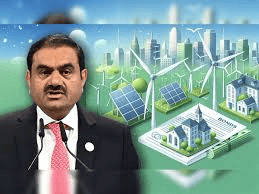
Why in news?
A 2019 tender by the Solar Energy Corporation of India (SECI) has become a focal point in a US district court indictment that claims Gautam Adani and others allegedly offered bribes amounting to ₹2,029 crore (approximately $265 million) to Indian government officials. This was purportedly to facilitate the signing of power supply agreements (PSAs) between SECI and state electricity distribution companies (DISCOMs), which were initially hesitant to engage due to elevated energy prices following the tender bidding process.
Specific Allegations Regarding the SECI Solar Bid:
- The US Department of Justice has accused Gautam Adani and his associates of bribing Indian government officials with around ₹2,029 crore (US $265 million).
- This bribery was allegedly intended to expedite the signing of PSAs between SECI and DISCOMs that were reluctant to commit due to high energy costs.
Failure to Secure Agreements:
- Following the tender award for 12,000 MW of generation capacity and 3,000 MW of module manufacturing capacity, SECI faced challenges in finalizing PSAs with DISCOMs.
- This failure jeopardized the lucrative letters of award (LOAs) that Adani Green and Azure Power anticipated from the project.
Scrutiny of SECI's Role:
- As a public sector entity under the Union Ministry of New and Renewable Energy, SECI's responsibility is to promote renewable energy sources.
- However, its failure to secure buyers for the power generated under this tender has drawn criticism.
Challenges Faced by SECI:
- SECI's difficulties in finding buyers were primarily due to DISCOMs' hesitance to enter PSAs at higher tariffs, expecting further reductions in solar power prices.
- This environment potentially fostered corrupt practices as companies sought alternative methods to secure contracts.
Impact on Credibility:
- The allegations have raised significant concerns regarding SECI's operational integrity and efficiency in managing large-scale renewable energy projects.
- Such issues may undermine public trust in governmental processes related to renewable energy procurement.
Potential Repercussions for India's Renewable Energy Sector:
- Investor Confidence:The indictment could dissuade foreign investments in India's renewable energy sector, as potential investors might perceive the allegations as signs of systemic corruption.
- Regulatory Scrutiny:Increased scrutiny from regulatory bodies, both domestic and international, might lead to more stringent regulations and oversight of bidding processes and contract awards in the renewable sector.
- Market Dynamics:If the allegations are substantiated, they could disrupt existing contracts and compel DISCOMs to rethink their engagements with solar projects, fearing further legal issues or reputational damage.
- Long-term Impact on Policy:This case could trigger reforms aimed at enhancing transparency and accountability within government procurement processes for renewable energy projects.
Way Forward:
- Rebuild Investor Confidence:The government needs to engage actively with international stakeholders, ensuring them of corrective actions and fostering a business-friendly environment through improved governance.
- Strengthen Regulatory Frameworks:India should enhance transparency in renewable energy procurement by establishing robust anti-corruption mechanisms and independent oversight committees.
Mains PYQ:
Explain the purpose of the Green Grid Initiative launched at the World Leaders Summit of the COP26 UN Climate Change Conference in Glasgow in November 2021. When was this idea first floated in the International Solar Alliance (ISA)?
GS2/International Relations
ICC issues arrest warrant against Israel’s Netanyahu, Gallant
Source:Indian Express
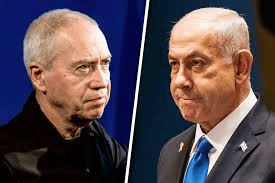
Why in news?
The International Criminal Court (ICC) has issued arrest warrants for Israeli Prime Minister Benjamin Netanyahu, former defense minister Yoav Gallant, and Hamas leader Mohammed Diab Ibrahim Al-Masri on allegations of war crimes and crimes against humanity. This development follows ICC Prosecutor Karim Khan's announcement on May 20, which sought warrants related to the Hamas attack on Israel on October 7, as well as subsequent military actions in Gaza.
Understanding the ICC
- The ICC is a permanent court established to prosecute serious international crimes committed by individuals.
- It addresses offenses such as genocide, war crimes, crimes against humanity, and aggression.
- The court aims to combat global impunity, ensuring that criminals are held accountable under international law, regardless of their position.
- It operates separately from the International Court of Justice, which is also located in The Hague.
Headquarters and Statute
- The ICC is headquartered in The Hague, Netherlands.
- The founding treaty, known as the Rome Statute, was adopted by the UN General Assembly in 1998 and made functional in 2002.
Membership
- Countries wishing to join the ICC must sign and ratify the Rome Statute through their national legislatures.
- As of now, 124 countries are members, with a majority being from Africa.
- Notably, countries such as India, China, Iraq, North Korea, and Turkey have never signed the Rome Statute.
- Countries like the US, Russia, Israel, and Syria signed the statute but have not ratified it.
Judges & Prosecutors
- The ICC conducts investigations through the Office of the Prosecutor, supported by a bench of 18 judges.
- Both judges and prosecutors serve non-renewable terms of nine years.
Investigation Process
- The ICC has pre-trial, trial, and appellate benches.
- The prosecutor begins with a preliminary examination before seeking pre-trial judges' permission to initiate a full investigation.
- To proceed, the prosecutor must find that the crimes meet a threshold of gravity.
How Investigations Are Initiated
- Investigations can be opened in three ways:
- By referral from a member country regarding crimes in its territory.
- By referral from the UN Security Council.
- By the prosecutor acting proprio motu (on their own initiative).
- Non-member states may also be investigated in three scenarios:
- If crimes are committed by non-members within member states.
- If non-members accept the court’s jurisdiction.
- When authorized by the Security Council.
Accusations Against Netanyahu and Gallant
- The ICC has charged Netanyahu and Gallant with starvation as a war crime, along with murder, persecution, and other inhumane acts.
- They are accused of deliberately depriving Gaza's civilians of basic necessities like food, water, medicine, fuel, and electricity from October 8, 2023, to May 20, 2024.
- Furthermore, by limiting medical supplies, including anesthetics, they allegedly caused significant suffering to those requiring medical attention.
- The ICC also holds them accountable for actions carried out by Israeli forces under their command, which include torture, violence, killings, rape, and property destruction.
Consequences of the ICC's Arrest Warrant
- The arrest warrants issued by the ICC are binding but depend on member states for enforcement.
- If Netanyahu or Gallant travels to any ICC member state, those governments are obliged to arrest and extradite them to The Hague.
- While the ICC has previously issued warrants against figures like Russian President Vladimir Putin, Netanyahu's situation is more complicated due to the support Israel receives from many of its allies, such as Germany, France, and the UK, who are unlikely to arrest him.
- Overall, the warrant represents a moral victory for Palestine, amplifying international pressure on Israel and complicating Netanyahu’s travel, albeit without causing diplomatic embarrassment.
GS2/Governance
Project Veer Gatha 4.0
Source:ANI News
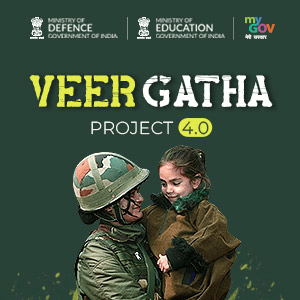
Why in News?
Over 1.76 crore school students participated in Project Veer Gatha 4.0, sharing creative tributes to the bravery and sacrifice of Armed Forces personnel.
About Project Veer Gatha:
- Launched in 2021 to honor the acts of bravery and selfless sacrifice of Gallantry Awardees.
- 1.76 crore students from 36 states and UTs participated.
- Conducted annually since its inception, with increasing participation:
- First Edition (2021): 8 lakh students
- Second Edition (2022): 19.5 lakh students
- Third Edition (2023): 1.36 crore students
Aims and Objectives
- Instill patriotism and national pride among students.
- Spread awareness about the heroic contributions of Gallantry Awardees.
- Foster creativity through various forms of artistic expression.
- Promote national unity and pride across India’s diverse school system.
- Enhance knowledge about unsung heroes and military heritage.
Features of the Program
- Creative content submissions, including poems, paintings, essays, and videos.
- 100 national-level winners annually, with a ₹10,000 cash prize and recognition by the Ministry of Education and Ministry of Defence.
- District and state awards for outstanding students.
- Educational outreach programs by the Ministry of Defence to engage students.
- Digital submission via the MyGov portal, making the process inclusive and easy for wide participation.
GS3/Environment
Is Delhi Becoming an Uninhabitable City?
Source:The Hindu
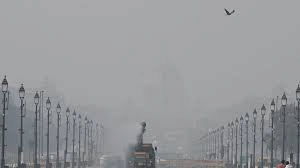
Why in news?
Delhi is grappling with severe air pollution, which has raised concerns about the city's habitability. This article delves into various aspects of air pollution in Delhi, including its trends, contributors, health impacts, and the government's response.
Overview of Air Pollution in Delhi:
- Delhi is facing significant environmental challenges, particularly severe air pollution and extreme weather conditions, especially during winter and summer.
- The Air Quality Index (AQI) reveals alarming pollution levels in the city, predominantly caused by fine particulate matter (PM2.5) that poses serious health risks.
Air Quality Trends (2017–2023):
- Healthy Air Days: On average, Delhi experiences only two days per year with air classified as healthy.
- Poor Air Quality: Residents breathe air deemed unfit for health for more than half the year.
- Lockdown Impact: During the COVID-19 lockdown in 2020, air quality saw only marginal improvements, indicating deeper systemic issues.
Contributors to Air Pollution:
- Stubble Burning: Often blamed for pollution spikes, stubble burning contributes to 15–35% of PM2.5 on peak pollution days. However, high AQI levels persist even without this factor.
- Local Sources:Research from IIT and TERI shows that local activities account for half of PM2.5 in winter, with significant contributions from:
- Vehicles (58%): Includes combustion exhaust (34%) and emissions from wear-and-tear (24%).
- Other sources: Construction dust and industrial emissions also play a role.
Seasonal Worsening in Winters:
- Meteorological Factors: Cold air traps pollutants close to the ground, while stagnant winds hinder their dispersion.
- Rain and Wind Effects: Months with increased rainfall (July–September) and stronger winds (February–June) tend to have better air quality.
Health Impacts:
- WHO Findings: Air pollution adversely affects nearly every organ in the body, causing systemic inflammation and potential carcinogenic effects.
- Death Rates: In 2019, approximately 1.67 million deaths in India were linked to pollution, with Delhi experiencing higher mortality rates from ambient PM pollution compared to the national average.
- Class Divide: Marginalized communities are more exposed to pollution, leading to significantly reduced life expectancy for children in these areas compared to their affluent counterparts.
Government Response:
- Short-term Measures: Initiatives like odd-even vehicle rules, water sprinklers, and mask distributions have had limited effectiveness.
- Political Stalemate: Ongoing blame between central and Delhi governments has obstructed necessary systemic reforms.
Solutions Needed:
- Public Transport Overhaul: Shifting from private vehicles to cleaner, efficient public transportation with better last-mile connectivity is essential.
- Holistic Action Plan: Long-term strategies are needed to tackle emissions from all sources, along with political commitment to reverse the decline in air quality.
GS2/International Relations
A Bilateral Investment Treaty With a ‘Bit’ of Change
Source: The Hindu

Why in News?
The recently signed Bilateral Investment Treaty (BIT) between India and the United Arab Emirates (UAE) signifies a major shift in India's strategy towards international investment agreements. This new BIT replaces the previous investment treaty from 2014, showcasing India's evolving position and potentially influencing its negotiations with entities such as the United Kingdom and the European Union. It is crucial to examine the objectives of the BIT, its key deviations from India's Model BIT, and its implications regarding investment protection and state sovereignty.
BIT’s Objectives:
- The primary aim of a well-structured BIT is to find a balance between protecting foreign investments and allowing the host state to maintain its regulatory independence.
- India-UAE BIT demonstrates considerable progress in achieving this balance while also highlighting both similarities and differences with India's Model BIT established in 2015.
Key Departures from India’s Model BIT:
- Exhaustion of Local Remedies: The India-UAE BIT has shortened the timeframe for exhausting local remedies before initiating investor-state dispute settlement (ISDS) claims to three years, compared to five years in the Model BIT. This change acknowledges inefficiencies in India's judicial system, providing quicker access to international arbitration for foreign investors.
- Redefining Investment: The definition of 'investment' has been modified in the India-UAE BIT. It focuses on objective economic characteristics, such as capital commitment, profit expectation, and risk assumption, removing the subjective criterion of significantly contributing to the host state's development.
- Greater Clarity: Treatment of Investments: Article 4 clarifies instances of treaty violations without linking them to customary international law (CIL), which remains vague. This change enhances legal certainty for both investors and states.
Points of Continuity with India’s Model BIT:
- Exclusion of the Most-Favoured-Nation (MFN) Clause: Notably, the BIT excludes the MFN provision, which usually ensures equal treatment for investors from different countries. This exclusion helps India avoid treaty shopping, where investors could exploit favorable terms from other treaties.
- Exclusion of Taxation Measures: Similar to the Model BIT, the India-UAE BIT excludes tax-related disputes from ISDS mechanisms, reinforcing India's view that taxation is a sovereign function and should be protected from international arbitration.
- Limitation on ISDS Tribunal Jurisdiction: The BIT restricts ISDS tribunals from reviewing domestic court decisions, affirming India's belief that its judicial system should manage legal disputes independently.
- Reinforcement of Sovereign Regulatory Space: The treaty continues to prioritize India's regulatory independence, ensuring that India retains control over its internal policymaking while promoting foreign investment.
Broader Implications of Continuity and Impact on Future Treaties:
- The continuities in the BIT reflect India's cautious approach to investment treaties, accommodating investor concerns while maintaining critical policy spaces, such as the exclusion of the MFN clause and taxation measures.
- This treaty may influence ongoing and future negotiations with other nations, reinforcing India's commitment to a predictable investment treaty framework.
Conclusion:
- The India-UAE BIT represents a significant document that captures India's balanced approach to international investment, addressing investor interests while safeguarding its regulatory autonomy.
- This treaty showcases a pragmatic path forward, providing insights into the future direction of India's investment treaty practices within a complex global economic environment.
GS3/Environment
Species in news: King Cobra
Source:Times of India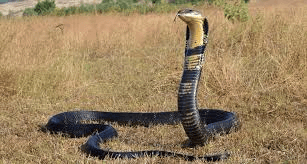
Why in News?
A recent 12-year study conducted by researchers from the Kalinga Centre for Rainforest Ecology has uncovered that the king cobra, which was once thought to be a single species, is actually made up of four distinct species.
Important Facts about King Cobra:
- Scientific Name: Ophiophagus hannah.
- It is recognized as the largest venomous snake, capable of reaching lengths of up to 18 feet (5.5 meters).
- The venom of the king cobra is neurotoxic, which affects the nervous system of its prey.
Re-categorization:
- The Kalinga Centre for Rainforest Ecology has reclassified the king cobra into four species:
- O. Hannah (Northern King Cobra)
- O. bungarus (Sunda King Cobra)
- O. kaalinga (Western Ghats King Cobra)
- O. salvatana (Luzon King Cobra)
- These species exhibit genetic differences of 1-4%, which supports their reclassification.
Habitat and Behavioural Features:
- King cobras inhabit tropical, subtropical, and temperate regions, including countries such as India, Sri Lanka, Southeast Asia, and the Philippines.
- They are solitary creatures and territorial, primarily feeding on snakes, lizards, birds, and rodents.
- Mating occurs annually during the monsoon season, with females capable of laying up to 40 eggs in nests.
- When threatened, they display their hood to appear larger as a defense mechanism.
- King cobras play a crucial role in controlling the populations of other snakes and maintaining ecological balance.
Conservation Status:
- IUCN Red List: Vulnerable
- CITES: Appendix II
- Wildlife (Protection) Act, 1972: Schedule II
GS2/International Relations
Global Alliance Against Hunger and Poverty
Source:Indian Express
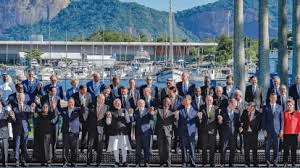
Why in news?
The Global Alliance Against Hunger and Poverty was officially launched during the G20 Leaders’ Summit in Rio de Janeiro, Brazil. Its primary objective is to accelerate efforts toward the eradication of hunger and poverty globally while promoting the achievement of the Sustainable Development Goals (SDGs).
Hunger and India
- The Food and Agriculture Organization (FAO) characterizes hunger as a state of food deprivation or undernourishment, where an individual consistently consumes fewer calories than necessary for a healthy and active life, which varies based on factors like sex, age, height, and activity level.
India's Hunger Ranking
- According to the Global Hunger Index (GHI) 2024, India holds the 105th position among 127 countries, indicating a 'serious' level of hunger.
- India's GHI score of 27.3 raises concerns, especially when juxtaposed with its neighbors in South Asia such as Bangladesh, Nepal, and Sri Lanka, which are categorized as having 'moderate' hunger levels.
The Need for the Alliance
- The 2030 Agenda for Sustainable Development, adopted by all UN member states in 2015, set ambitious targets to eliminate poverty and hunger and to ensure food security by the year 2030.
- The Covid-19 pandemic has reversed gains made in poverty reduction, leading to an increase in extreme poverty and deteriorating nutrition, particularly in the Global South.
- Projections suggest that by 2030, approximately 622 million people will be living below the extreme poverty line of $2.15 per day, and 582 million people will continue to experience hunger, a figure unchanged since 2015.
- Global conflicts, climate change, and social inequalities have impeded progress in these areas.
About the Alliance
- The Global Alliance Against Hunger and Poverty was initiated at the G20 summit in Rio de Janeiro, aiming to unite nations with the resources necessary to combat hunger.
- This initiative is spearheaded by Brazil's President Luiz Inácio Lula da Silva and emphasizes cash transfers, school meal programs, and support for farmers.
Aims/Objectives
- The primary goal of the alliance is to eliminate hunger and poverty by the year 2030, in alignment with the Sustainable Development Goals.
- One of its key objectives is to eliminate all nations from the FAO Hunger Map by promoting collaboration and mobilizing resources effectively.
Membership and Structure
- The alliance comprises 148 members, including 82 countries, the African Union, the European Union, 24 international organizations, 9 financial institutions, and 31 philanthropic and non-governmental organizations.
- Since July 2024, non-G20 countries have also been eligible for membership.
- Early members include Brazil, Bangladesh, and various G20 nations, with participation spanning all continents.
Key Pillars of the Alliance
- National: Focus on coordinating public policies specifically aimed at eradicating hunger.
- Knowledge: Emphasize the integration of data and technology to inform evidence-based solutions.
- Financial: Mobilize substantial resources to fund anti-hunger and poverty programs.
Strategic Commitments
- Income Distribution: Target reaching 500 million individuals through income support initiatives by 2030.
- School Meals: Aim to provide school meals to 150 million children residing in high-hunger regions.
- Financial Mobilization: Utilize multilateral banks to generate billions for anti-poverty projects.
Funding
- The alliance does not maintain a dedicated fund; instead, it relies on contributions from its member nations and institutions such as the FAO, UNICEF, and the World Bank.
- The estimated annual operational cost is between $2-3 million.
Technical Office
- The Technical Office is situated at the FAO and operates with functional autonomy.
- It is anticipated that the headquarters of the alliance will be established in Brasília or another country within the Global South.
Key Activities
- Conduct regular summits focused on addressing hunger and poverty.
- Establish a High-Level Champions Council to supervise the activities of the alliance.
Other Features
- Facilitates the sharing of best practices among member nations.
- Offers technical expertise and financial support for national policies aimed at eradicating hunger and poverty.
- Includes a policy framework comprising over 50 instruments designed for targeted assistance in various areas, such as school meals, cash transfers, support for smallholder and family farming, socio-economic inclusion initiatives, maternal and early childhood interventions, and enhancing access to water solutions.
- The Alliance serves as a platform to connect countries in need with donors and support organizations.
GS3/Science and Technology
India’s First Indigenous Antibiotic: Nafithromycin
Source:PIB
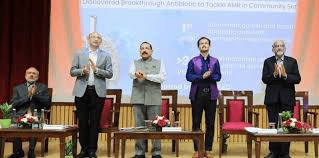
Why in news?
The Ministry of Science & Technology has introduced India’s first indigenous antibiotic designed to tackle drug-resistant infections.
About Nafithromycin:
- Developed with the backing of the Biotechnology Industry Research Assistance Council (BIRAC), which operates under the Department of Biotechnology.
- Aims to provide treatment for Community-Acquired Bacterial Pneumonia (CABP) caused by antibiotic-resistant bacteria.
- Currently awaiting final approval from the Central Drugs Standard Control Organization (CDSCO) for manufacturing and public distribution.
Features:
- Developed over a span of 14 years through clinical trials conducted in the U.S., Europe, and India.
- Demonstrates ten times more efficacy than azithromycin, requiring only three doses to effectively treat drug-resistant pneumonia.
- Exhibits minimal side effects, shows no significant drug interactions, and is independent of food intake.
Significance:
- Targets both typical and atypical pathogens, addressing a critical global health challenge, especially CABP, which is responsible for over 2 million deaths each year.
- Provides a more effective, quicker, and safer treatment option for drug-resistant pneumonia cases.
- Highlights successful collaboration between government entities and Wockhardt Pharmaceuticals.
- Represents a cost-effective solution for managing resistant infections, particularly in low-resource environments.
GS2/Governance
D’Cunha Committee
Source:The Hindu
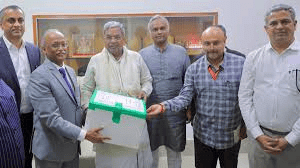
Why in News?
The D’Cunha Committee, led by retired High Court judge John Michael D’Cunha, has published a report that investigates the irregularities in the procurement and management of COVID-19 resources in Karnataka. This report has drawn attention due to significant concerns regarding the procurement of ventilators funded by the PM CARES Fund and the inflated prices of PPE kits.
Key Findings:
- The report highlights serious issues surrounding the procurement of ventilators, particularly under the PM CARES Fund.
- It raises alarms regarding the inflated costs of PPE kits, suggesting that there were unnecessary purchases.
- Concerns were also raised about questionable pricing for supplies sourced from Chinese companies.
What is the D’Cunha Committee?
- The committee was established in August 2023 to explore alleged irregularities in the procurement processes related to COVID-19 medical supplies.
- It was tasked with examining the procurement and disbursement of funds during the tenure of the previous government and identifying any administrative lapses or corruption.
Recommendations given by the Committee:
- Investigate Ventilator Procurement: The committee has recommended a thorough investigation into the procurement of 130 ventilators on March 22, 2020, which occurred under questionable circumstances, especially since similar supplies were available through PM CARES.
- Review Undelivered Ventilators: It suggested taking action regarding payments made for ventilators that were either not delivered or only partially delivered.
- Scrutiny of Price Variations: The committee called for an investigation into the significant price differences for ventilators, which varied from ₹5 lakh to ₹16.25 lakh.
- Probe PPE Kit Purchases: Further inquiry was recommended into the inflated prices of PPE kits purchased from Chinese firms, despite the availability of cheaper local options.
- Formation of SIT: The establishment of a Special Investigation Team (SIT) was recommended to further investigate the Karnataka Medical Supplies Corporation Ltd. (KSMSCL).
- Enhance Transparency: The committee urged for improved procedures to ensure greater accountability in future procurement processes.
|
55 videos|5389 docs|1141 tests
|
FAQs on UPSC Daily Current Affairs: 22nd November 2024 - Current Affairs & Hindu Analysis: Daily, Weekly & Monthly
| 1. What is the SECI solar bid related to Gautam Adani's indictment in the US? |  |
| 2. What are the implications of Gautam Adani's indictment for the Adani Group? |  |
| 3. How does the US legal system handle bribery and fraud cases involving foreign nationals? |  |
| 4. What measures has the Indian government taken to address corruption in large infrastructure projects? |  |
| 5. What is the significance of solar energy projects in India's renewable energy goals? |  |
















